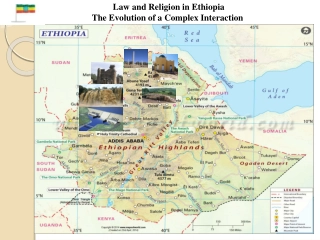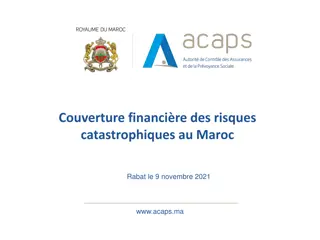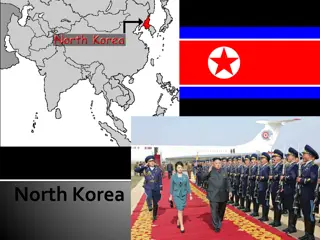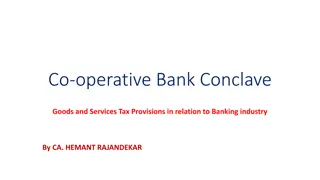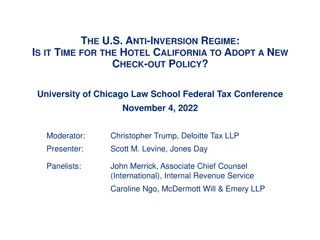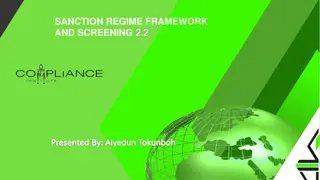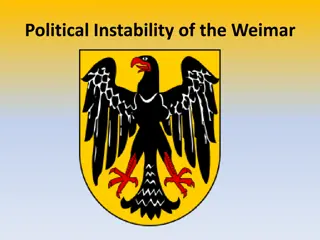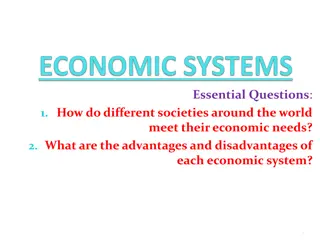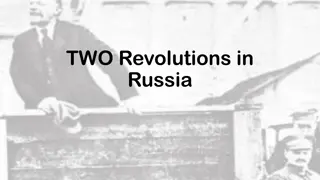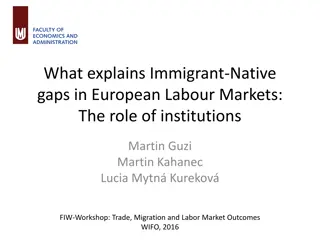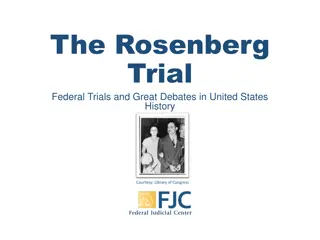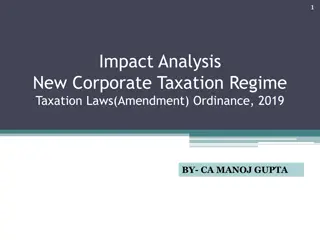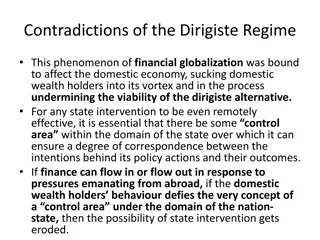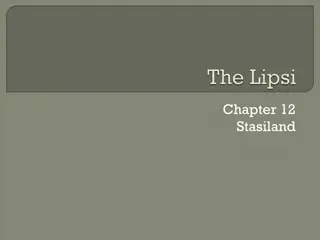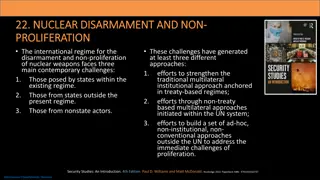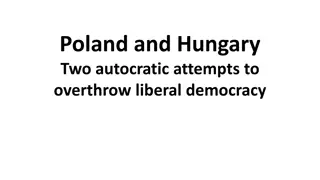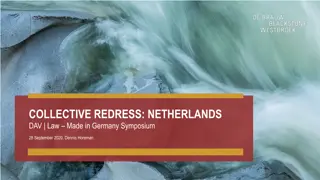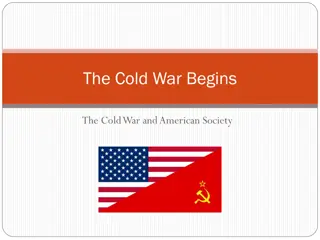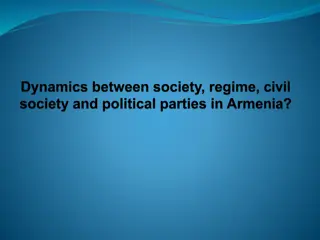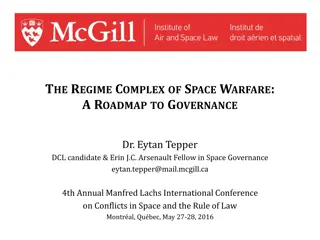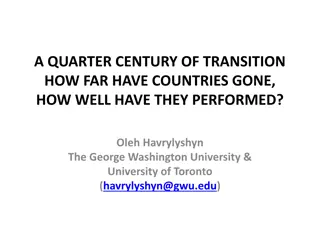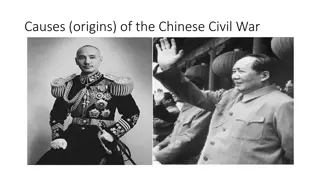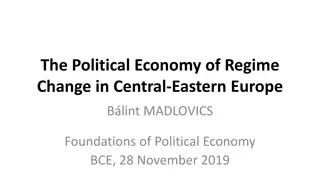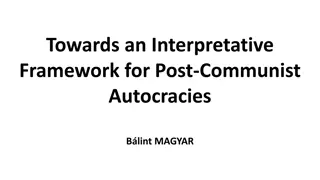Law and Religion in Ethiopia: A Historical Overview
Explore the evolution of the complex interaction between law and religion in Ethiopia, from Imperial Ethiopia to the Communist Era and the post-communist period. Discover the rich historical origins of Ethiopia, including its diverse religious landscape and unique governance structures. Delve into t
0 views • 28 slides
Risk Management and Catastrophic Events in Morocco
The article discusses the financial coverage of catastrophic risks in Morocco, including historical catastrophic events such as earthquakes, floods, and challenges in implementing a coverage regime. It highlights the architecture of the coverage regime, objectives, challenges, and solutions faced in
0 views • 14 slides
Provider Selection Regime (PSR) Policy Reference Slides
Policy reference slides supporting relevant authorities in applying the new Provider Selection Regime (PSR). Not exhaustive but provide guidance on regulations and statutory requirements. Includes implementation toolkit for senior managers and practitioners, covering key criteria, procurement proces
3 views • 31 slides
Understanding the Provider Selection Regime (PSR): Practitioner Reference Slides
Reference slides supporting relevant authorities in applying the new Provider Selection Regime (PSR) in healthcare services procurement in England. The slides provide guidance on PSR regulations and statutory recommendations, with details on the selection processes, transparency requirements, decisi
15 views • 81 slides
Introducing the Provider Selection Regime (PSR) in Health Care Services
The Provider Selection Regime (PSR) is a new set of rules under the Health and Care Act 2022 for procuring health care services in England. It aims to promote greater integration of health and care services by removing them from the scope of previous regulations. Relevant authorities like NHS Englan
1 views • 13 slides
Understanding the Provider Selection Regime (PSR) Draft Policy Reference Slides
These reference slides provide support for relevant authorities in applying the new Provider Selection Regime (PSR) in England. They outline the key features, criteria, and processes involved in the PSR implementation, offering guidance for practitioners, commissioners, and procurement leads. The PS
0 views • 31 slides
Insight into North Korea: Government, Rights, and the People
Learn about the communist regime in North Korea led by Kim Jong-un, the limited rights of its citizens, the government's control over businesses and resources, and the challenges faced by the people in this closed-off nation.
0 views • 17 slides
Analysis of GST Provisions in the Banking Industry
The Goods and Services Tax (GST) regime replaced the old service tax regime on July 1, 2017. In the context of the banking industry, the provisions governing GST for services provided by Cooperative Banks and Banking Cooperative Societies are similar to those of the service tax regime. While interes
1 views • 13 slides
Understanding the U.S. Anti-Inversion Regime & Potential Impact on Hotel California's Check-Out Policy
Explore the implications of the U.S. Anti-Inversion Regime on businesses like Hotel California and potential benefits of expatriating to reduce taxes and regulatory uncertainties. Learn about legislative history, limitations, and proposed reforms under Section 7874. Delve into the shifting landscape
1 views • 39 slides
Understanding Sanction Regime Framework and Screening Controls
The presented content illustrates the sanction regime framework and screening controls, highlighting the significance of sanctions, who should be screened, and what should be included in the screening process. It covers the scope of sanctions, the importance of sanction screening, tools used for scr
3 views • 42 slides
Political Instability of the Weimar Republic: Spartacist and Kapp Putsches
The Weimar Republic faced political instability due to uprisings like the Spartacist and Kapp Putsches, rooted in dissatisfaction with its surrender to the Allies, weak constitution, and failure to address food shortages. The Spartacist Rising of January 1919, led by figures like Karl Liebknecht and
3 views • 18 slides
Understanding Economic Systems and Their Impacts on Societies
Explore how different societies meet their economic needs through traditional, free enterprise, and communist economic systems. Learn about the advantages and disadvantages of each system, from the customs-based decisions in traditional economies to the government-controlled operations in communist
2 views • 17 slides
Two Revolutions in Russia: The March and November Revolutions of 1917
The year 1917 witnessed two significant revolutions in Russia - the March Revolution leading to the abdication of the Tsar and the formation of the Provisional Government, followed by the November Revolution where Lenin's Bolsheviks overthrew the Provisional Government and established the world's fi
0 views • 20 slides
Freshwater Fluxes from Greenland and Climate Regime Changes in the Arctic-North Atlantic System
Freshwater fluxes from Greenland are identified as a new regulator of climate regime changes in the Arctic-North Atlantic system. The Arctic Ocean Oscillation Index reveals two circulation regimes with alternating patterns. Correlations between the Arctic Ocean Oscillation and various environmental
1 views • 32 slides
Insights into Animal Farm: A Narrative of Betrayal and Manipulation
The narrative of Animal Farm encapsulates the evolution from an idealistic society to a manipulative regime, illustrating themes of betrayal, rule violations, manipulation, leadership exaggeration, harsh penalties, rumor spreading, forced labor, and emotional suppression within a communist-socialist
0 views • 10 slides
Competition Damages Claims: Limitation Periods and CAT Rules Overview
The Consumer Rights Act 2015 introduced a new regime for competition damages claims, allowing for stand-alone and follow-on claims. However, limitations periods under the new regime, specifically Section 47E CA, apply only to claims arising after 1 October 2015. The CAT Rules play a crucial role in
0 views • 47 slides
Exploring National Identity and Revolutionary Ideals in European History
In this discussion, we delve into Karl Marx's beliefs in the Communist Manifesto, the lack of Communist revolutions in the 19th century, the role of national identity in societies, and the concept of imagined communities as outlined by Benedict Anderson. Through analyzing historical events and schol
2 views • 10 slides
The Cold War Expansion and Nuclear Arms Race
The Cold War intensified as the Soviet Union detonated an atomic bomb, leading to heightened tensions. Communist advancements, including the takeover of communist China, shocked the world. Nuclear arsenals expanded with the development of the hydrogen bomb, sparking concerns of an arms race. Eisenho
0 views • 17 slides
Understanding Immigrant-Native Gaps in European Labor Markets
The paper explores the role of institutions in explaining immigrant-native gaps in European labor markets, focusing on aspects like labor market regulation, skill regime, welfare state regime, and production regime. It discusses how factors such as job prospects for immigrants, centralized wage barg
0 views • 23 slides
The Rosenberg Trial and the Red Scare: Cold War Espionage and Anti-Communist Hysteria
The Rosenberg Trial during the Cold War era exemplified the heightened tensions of the time, showcasing accusations of espionage, Communist subversion, and anti-American sentiment. Julius and Ethel Rosenberg faced allegations of passing atomic secrets to the Soviet Union, amid a backdrop of fear and
0 views • 14 slides
Impact Analysis of New Corporate Taxation Regime Under Taxation Laws (Amendment) Ordinance, 2019
The new corporate taxation regime introduced through the Taxation Laws (Amendment) Ordinance, 2019 brings significant changes, including a lower tax rate for domestic companies. The regime allows companies to opt for a 22% tax rate, with implications on exemptions and deductions. Companies opting fo
0 views • 31 slides
Challenges of the Dirigiste Regime in Financial Globalization
The Dirigiste regime faced contradictions in the context of financial globalization, impacting domestic wealth holders and the effectiveness of state interventions. Internal contradictions and the need for state involvement in infrastructure development and economic regulation further complicated th
0 views • 12 slides
Allegorical Representation of GDR Oppression in "Stasiland
The imagery in "Stasiland" delves into the symbolism of GDR oppression through cultural artifacts like The Lipsi dance, revealing the manipulative propaganda tactics of the regime. Funder's portrayal of the dance reflects the mechanical nature of the Stasi, shedding light on the absurdity of GDR ide
0 views • 11 slides
Voluntary Vaccination Regime and State Intervention in Ireland
The article discusses the voluntary/consensual vaccination regime in Ireland, focusing on parental consent and the threshold for state intervention. It explores disputes between parents, litigation on vaccination programs, and considerations for potential changes to the vaccination regime. Compariso
0 views • 10 slides
Contemporary Challenges in Nuclear Disarmament and Non-Proliferation Regime
The international regime for nuclear disarmament and non-proliferation faces challenges from states within and outside the regime, as well as non-state actors. Various approaches are being utilized to address these challenges, including strengthening multilateral institutions, non-treaty-based multi
0 views • 12 slides
Comparing Autocratic Attempts in Poland and Hungary
Poland and Hungary exhibit common ideological frames in their autocratic attempts, focusing on regime change rather than government shifts. These attempts utilize ethnonationalism, Euro-skepticism, and xenophobia to justify their actions. The two countries also showcase different types of post-commu
0 views • 15 slides
Collective Redress Regime in Netherlands: Evolution and Current Framework
The collective redress regime in the Netherlands has evolved over the years, with significant changes introduced since January 2020. Under the current framework, the law allows for claiming monetary damages collectively, with specific criteria for admissibility and stricter requirements for represen
0 views • 9 slides
The Impact of the Red Scare and McCarthyism on American Society
The Cold War era saw the rise of the Red Scare and McCarthyism in America, fueled by fears of Communist infiltration. The loyalty review program, House Un-American Activities Committee, and infamous cases like Alger Hiss and the Rosenbergs reflect the intensity of the anti-Communist hysteria. Joseph
0 views • 12 slides
The Red Scare and Anti-Communist Hysteria in Post-World War II America
Americans in the post-World War II era were gripped by fears of communism, leading to the Red Scare and intense anti-communist sentiment. This period saw the rise of initiatives like the Loyalty Review Board and the House Committee on Un-American Activities, which targeted suspected communists in va
0 views • 16 slides
Main Actors Society and Regime Characteristics Analysis
Analysis reveals a society characterized by passivity, apathy, and patron-client relationships, with emigration as a major form of social protest. The regime exhibits consolidating authoritarianism, convergence of business and political elites, and systemic corruption. Oligarchic dominance, small an
0 views • 6 slides
Impact of Transition to Peace Regime on Korean Peninsula Security
Explore the impact of transition to a peace regime on the security of the Korean Peninsula through topics such as the Panmunjom Joint Security Area, the Demilitarized Zone, and the division between North and South Korea since the Korean War. Discover the significance of a peace treaty in Northeast A
0 views • 29 slides
Quantum Brownian Regime in Quarkonium Dynamics: Insights and Applications
Exploring quarkonium dynamics in the quantum Brownian regime using non-abelian quantum master equations reveals crucial aspects such as regeneration processes, quarkonia at finite temperature, and distinct regimes based on spectral density and dissociation mechanisms. The study delves into quantum m
0 views • 44 slides
Education for Peace: A Call to Prioritize Socio-Educational Changes
Communist regime propaganda has sidelined the importance of educating about peace in public discourse. The concept of peace encompasses the absence of war, violence, and the promotion of tolerance. Defining education for peace entails shaping attitudes towards living harmoniously with oneself, other
0 views • 12 slides
The Regime Complex of Space Warfare: A Governance Roadmap
Delve into the intricate world of space warfare governance with Dr. Eytan Tepper and Erin J.C. Arsenault as they explore regime theory, regime complexes, and the existing framework of space warfare. Discover the types of space warfare, the theaters involved, and recommendations for future actions wi
0 views • 12 slides
The Artistic Journey of Thomas Wilkowski & Richard Taggart
Thomas Wilkowski and Richard Taggart were renowned artists known for their contributions to puppet animation and illustration. Born in 1912 in Bohemia, Wilkowski began sculpting puppets and later illustrated numerous children's books, earning recognition such as the Hans Christian Andersen Award. De
0 views • 10 slides
A Brief History of Communism: From Capitalism to Karl Marx's Vision
The history of communism traces back to the capitalist system's exploitation of workers in the mid-1800s. Karl Marx's vision, outlined in "The Manifesto of the Communist Party," aimed for economic equality and worldwide revolution. The inherent flaws of capitalism were critiqued, leading to the rise
0 views • 17 slides
Economic Transition in Post-Communist Countries: A Quarter Century Review
This presentation by Oleh Havrylyshyn explores the progress and performance of post-communist economies since the fall of the Berlin Wall in 1989. It compares different countries' approaches to marketization, privatization, economic performance, and political transformation. The analysis highlights
1 views • 28 slides
Causes and Origins of the Chinese Civil War
The Chinese Civil War was sparked by a variety of factors including a power vacuum, weak government, competing interests, ideological differences, and foreign intervention. Demographically, China is primarily inhabited by the Han Chinese with over 500 national minorities. The Qing (Manchu) dynasty's
0 views • 17 slides
The Political Economy of Regime Change in Central-Eastern Europe
The content discusses the concepts of socialism and capitalism, exploring various models and transitions from socialism to capitalism. It focuses on regime changes in Central and Eastern Europe, with case studies on Poland and Hungary. The text covers different varieties of socialism and their econo
0 views • 21 slides
Framework for Understanding Post-Communist Autocracies
The illusion of linear progress towards liberal democracies post-1989-1990 revolutions is challenged by the complex reality of post-communist autocracies. This framework explores the characteristics of democracy, autocracy, and dictatorship to categorize regimes, highlighting the challenges and nuan
0 views • 41 slides
